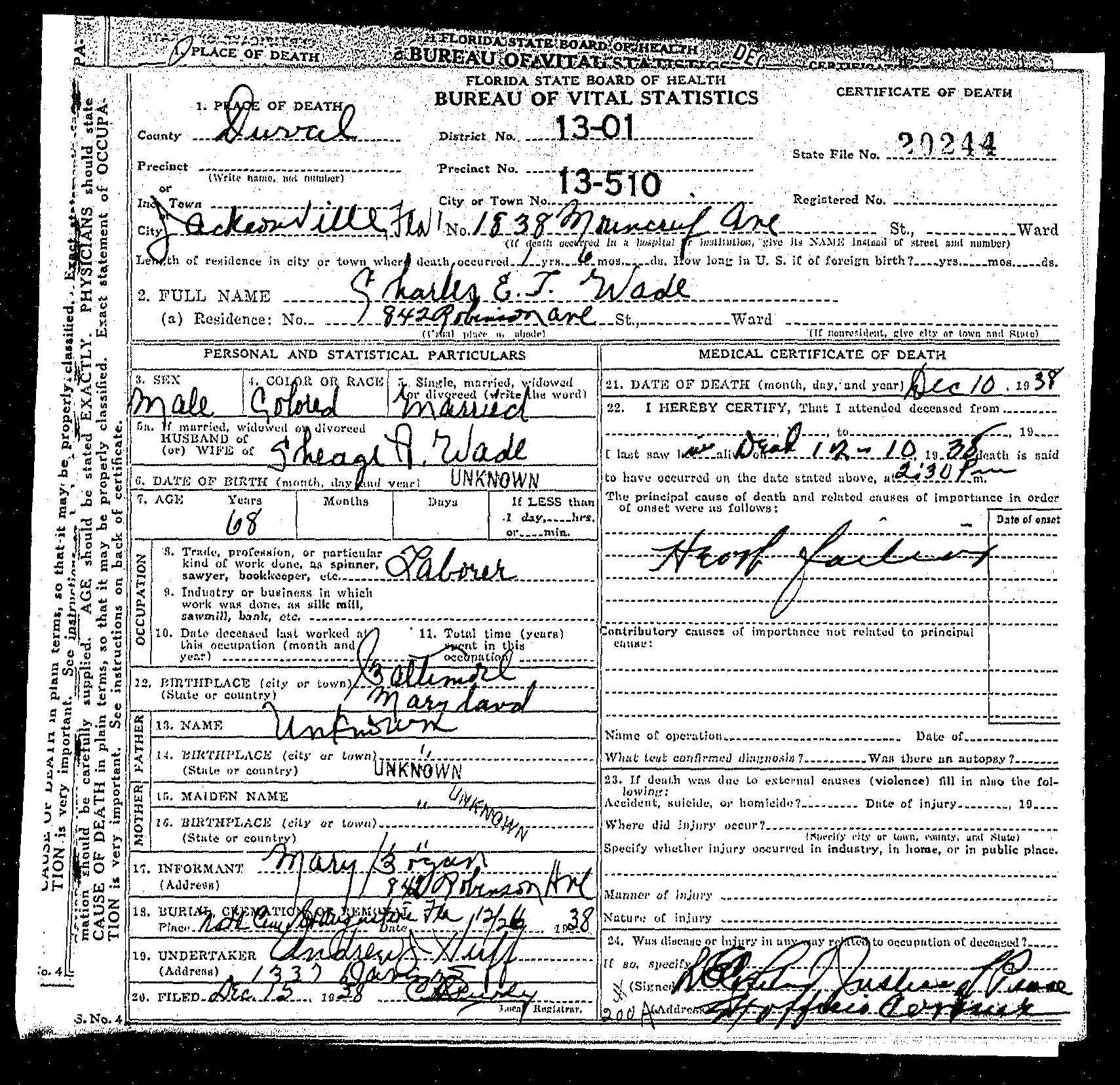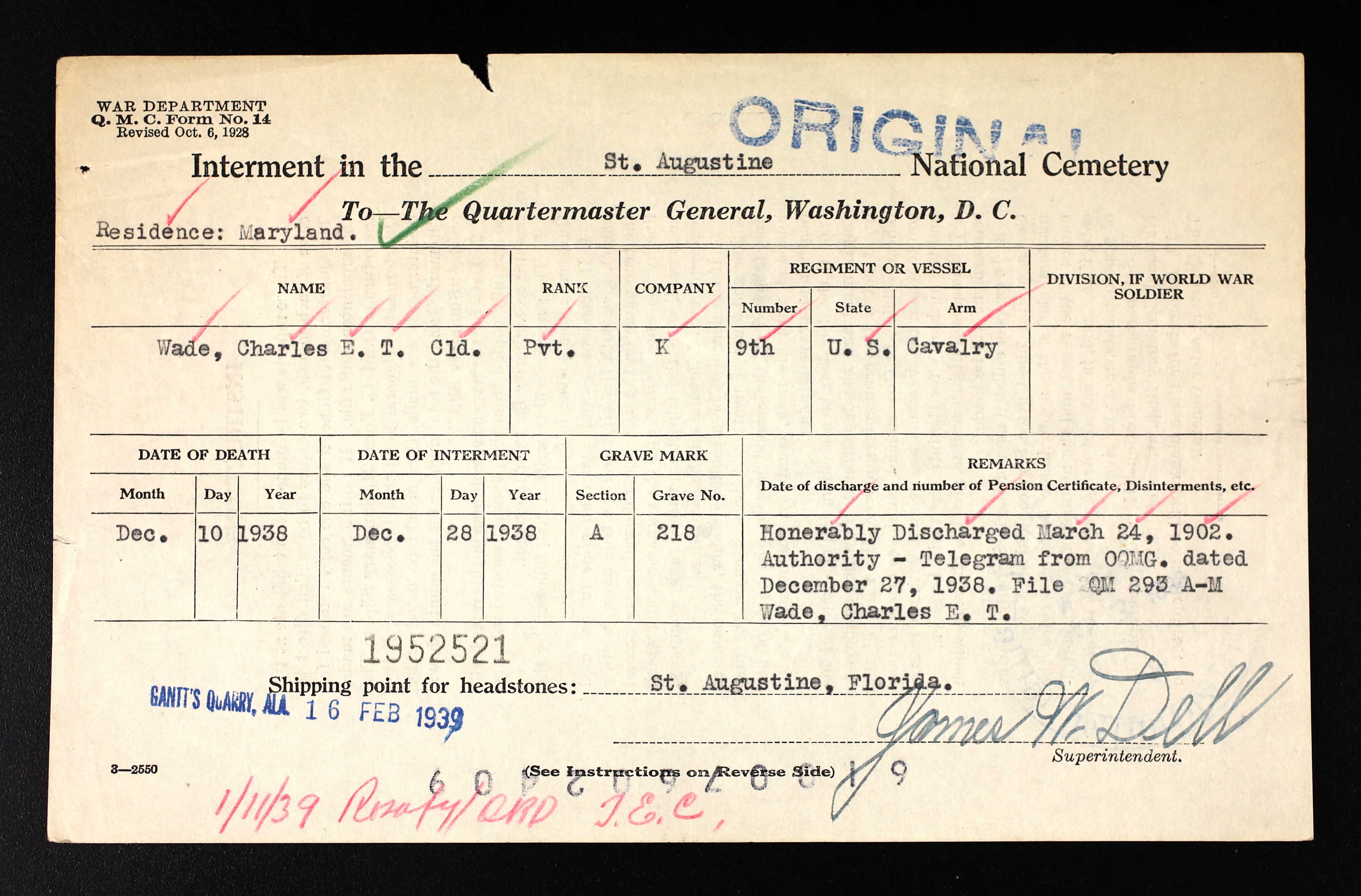Charles E.T. Wade (c. 1870–December 28, 1938)
By Sofie Barrett
Charles E.T. Wade served in the Philippine-American War as a Private. Wade was born around 1870 in the West Indies. It is unclear when he migrated to America, but when he did, he settled in the state of Maryland. Wade worked as a laborer before entering service. He served three years in the Army before being honorably discharged and settling in the Philippines.1
On December 10, 1898, US officials signed the Treaty of Paris ending the Spanish-American War. As part of this agreement, the US paid the Spanish government a lump sum for the Philippine Islands ending their 400-year rule. Led by Emilio Aguinaldo in February 1899, the Filipino population resisted this change in colonial leadership and began the fight for their independence. Unwilling to give up new territory, the American military fought long and hard to suppress the revolution. This sparked the Philippine-American war that was fought from 1899 to 1902. Aware of their disadvantages in the war, the Filipino resistance resorted to guerrilla-style warfare; fast pace, small scale actions against the American forces that deemed these men as irregulars or bandits.2
Wade enlisted on March 25, 1899 in Baltimore, Maryland at the age of 27. He enlisted in the Company K, Ninth US. Cavalry, a segregated unit primarily composed of African American soldiers. The Ninth US Cavalry served on the Western Frontier in operations against Native Americans. The term Buffalo Soldiers was given to all men of the Ninth and Tenth US Cavalry and the Twenty-fourth and Twenty-fifth Infantry that fought in the Indian Wars. There are several theories on how these men received this name. One theory claims the nickname arose because the soldiers’ dark, curly hair resembled the fur of a buffalo. Another assumption is the soldiers fought so valiantly and fiercely that the Indians respected them as they did the mighty buffalo.3
On March 29, 1899, four days after enlistment, Wade and the Company K, Ninth Cavalry were stationed in Fort Huachuca, Arizona, alongside Companies L and M. This fort was the home for black soldiers throughout the U.S. Army’s history and the only base that hosted, at different times, all units associated with the Buffalo Soldiers. However, the Ninth Cavalry did not return after this short visit.4
From July 13 to July 18, 1900, Wade and several other privates from the Ninth Cavalry unit served in Price, Utah. These men were tasked with escorting funds for Native Americans to an undisclosed location. This duty was important because it was rumored that several members of the Butch Cassidy’s Wild Bunch were in Price, Utah, and surrounding areas. Led by Butch Cassidy, this group of outlaws were very prominent in the 1880s and 1890s. These men robbed banks and trains prompting the Army to supply military escorts for money transfers. The Dawes Act of 1887, also known as the General Allotment Act, mandated these payments to encourage Indian tribes to assimilate into American culture and leave behind communal living. If they left behind their culture and the tribe and adopted the white man’s traditions they received money and land for their family.5
Wade then went overseas with the Ninth Cavalry in the early 1900s and was stationed in the Philippine Islands. While there, the soldiers guarded small villages and military bases to maintain peace in various towns. Their service did not included scouting and hunting down small insurrectionary or criminal bands.6
Wade was honorably discharged on March 24, 1902 in Draga in the Philippine Islands, and it is believed that he remained in the Philippines following his service. Wade married a Philippine woman named Seage Awai Soong and had a daughter, Federica Wade, born in 1910. On November 23, 1921, Wade applied for pension status, but his application was deemed invalid and he did not receive any money. On July 2, 1935, Wade boarded the USS Grant traveling from Manila, Philippine Islands, to San Francisco, California. He traveled as a paying passenger and an ex-soldier. Wade died on December 10, 1938 in Jacksonville, Florida. He was interred on December 28, 1938 at the Saint Augustine National Cemetery in Saint Augustine, Florida. He is interred in Section A, Grave 218.7
Endnotes
1 “U.S. Army, Register of Enlistments, 1798-1914,” database, (Ancestry.com: accessed July 16, 2019) entry for Charles E.T. Wade; “U.S., Army Transport Service, Passenger Lists, 1910-1939,” database, (Ancestry.com: accessed July 16, 2019) entry for Charles E.T. Wade
2 The Philippine-American War, 1899–1902." Office of the Historian. Accessed August 08, 2019. https://history.state.gov/milestones/1899-1913/war.; Asprey, Robert Brown. "Guerrilla Warfare." Encyclopedia Britannica. Accessed August 20, 2019. https://www.britannica.com/topic/guerrilla-warfare.
3 “The Philippine-American War, 1899–1902." Office of the Historian. Accessed August 08, 2019. https://history.state.gov/milestones/1899-1913/war; “U.S. Army, Register of Enlistments, 1798-1914,” database, (Ancestry.com: accessed July 16, 2019) entry for Charles E.T. Wade.; "Buffalo Soldiers." History.com, December 07, 2017. Accessed July 16, 2019. https://www.history.com/topics/westward-expansion/buffalo-soldiers.
4 “U.S., Buffalo Soldiers, Returns from Regular Army Cavalry Regiments, 1866-1916,” database, (Ancestry.com: accessed July 16, 2019) entry for Charles E.T. Wade; Smith, Steven D. "The African American Soldier at Fort Huachuca, Arizona, 1892-1946." University of South Carolina Scholar Commons, February 2001. Accessed July 16, 2019. https://scholarcommons.sc.edu/cgi/viewcontent.cgi?article=1054&context=anth_facpub.
5 “U.S., Buffalo Soldiers, Returns from Regular Army Cavalry Regiments, 1866-1916,” database, (Ancestry.com: accessed July 16, 2019) entry for Charles E.T. Wade; Staff, HistoryNet. "Buffalo Soldiers in Utah Territory." HistoryNet. August 09, 2016. Accessed July 16, 2019. https://www.historynet.com/buffalo-soldiers-in-utah-territory.htm; Britannica, The Editors of Encyclopaedia. "Dawes General Allotment Act." Encyclopedia Britannica, December 12, 2016. Accessed July 16, 2019. https://www.britannica.com/topic/Dawes-General-Allotment-Act.
6 "The Philippine-American War, 1899–1902." Office of the Historian. Accessed August 08, 2019. https://history.state.gov/milestones/1899-1913/war
7 U.S. National Cemetery Interment Control Forms, 1928-1962,” database, (Ancestry.com: accessed July 16, 2019) entry for Charles E.T. Wade; “Philippines, Select Marriages, 1723-1957,” database, (Ancestry.com: accessed July 16, 2019) entry for Charles E.T. Wade; “U.S., Army Transport Service, Passenger Lists, 1910-1939,” database, (Ancestry.com: accessed July 16, 2019) entry for Charles E.T. Wade; “U.S., Buffalo Soldiers, Returns from Regular Army Cavalry Regiments, 1866-1916,” database, (Ancestry.com: accessed July 16, 2019) entry for Charles E.T. Wade; “U.S., Civil War Pension Index: General Index to Pension Files, 1861-1934,” database, (Ancestry.com: accessed July 16, 2019) entry for Charles E.T. Wade.
© 2019, University of Central Florida




